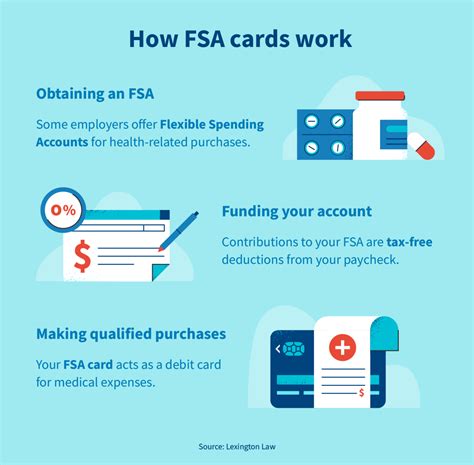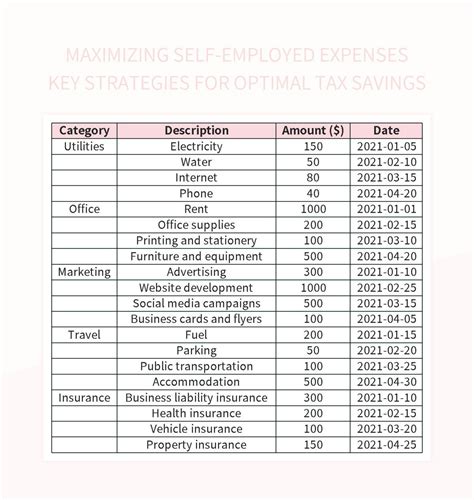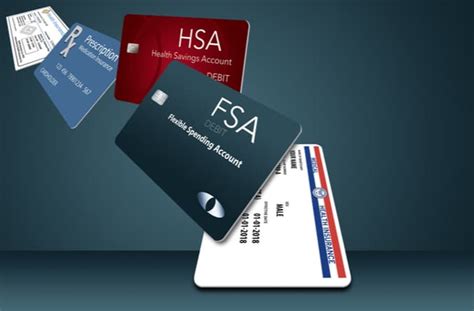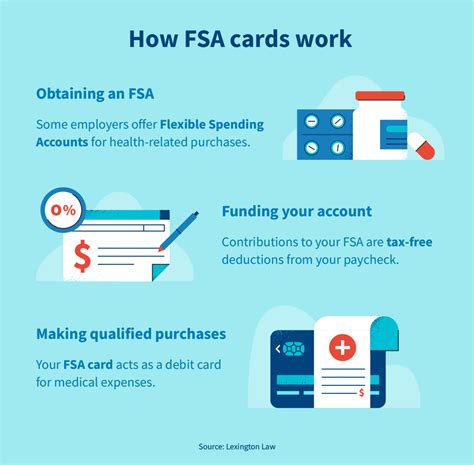Intro
Discover FSA card benefits, including tax-free savings, flexible spending, and hassle-free reimbursements for medical expenses, childcare, and commuting costs, maximizing your healthcare and dependent care advantages.
The FSA card, also known as a Flexible Spending Account card, has become an essential tool for many individuals and families to manage their healthcare expenses. With the rising costs of medical care, having a way to set aside pre-tax dollars for eligible expenses can be a significant advantage. In this article, we will delve into the benefits of using an FSA card, how it works, and what expenses are eligible for reimbursement.
For those who are new to the concept of FSA cards, it's essential to understand that these accounts are designed to help individuals and families save money on healthcare expenses. By setting aside a portion of their income on a pre-tax basis, individuals can reduce their taxable income, which in turn reduces their tax liability. This means that the money contributed to an FSA account is not subject to federal income tax, Social Security tax, or Medicare tax. As a result, individuals can save up to 30% or more on their healthcare expenses, depending on their tax bracket.
The benefits of using an FSA card are numerous. One of the most significant advantages is the ability to budget for healthcare expenses throughout the year. With an FSA card, individuals can allocate a specific amount of money for eligible expenses, such as doctor visits, prescription medications, and medical equipment. This helps to ensure that they have sufficient funds to cover unexpected medical expenses, reducing the financial burden on their household. Additionally, FSA cards can be used to pay for expenses that are not covered by insurance, such as vision care, dental care, and over-the-counter medications.
FSA Card Benefits

Some of the key benefits of using an FSA card include:
- Reduced taxable income: Contributions to an FSA account are made on a pre-tax basis, reducing taxable income and lowering tax liability.
- Increased savings: By setting aside money for healthcare expenses on a pre-tax basis, individuals can save up to 30% or more on their medical expenses.
- Budgeting tool: FSA cards help individuals budget for healthcare expenses throughout the year, ensuring that they have sufficient funds to cover unexpected medical expenses.
- Convenience: FSA cards can be used to pay for eligible expenses at the point of purchase, eliminating the need for reimbursement forms and paperwork.
How FSA Cards Work
FSA cards are typically offered by employers as part of their benefits package. Employees can elect to contribute a portion of their income to an FSA account on a pre-tax basis. The contributions are then deposited into the FSA account, and the employee can use the funds to pay for eligible expenses throughout the year. FSA cards can be used to pay for expenses such as: * Doctor visits * Prescription medications * Medical equipment * Vision care * Dental care * Over-the-counter medicationsEligible Expenses

It's essential to note that not all expenses are eligible for reimbursement with an FSA card. The IRS sets guidelines for eligible expenses, which include:
- Medical expenses: Expenses related to the diagnosis, treatment, and prevention of medical conditions.
- Prescription medications: Medications prescribed by a doctor to treat a medical condition.
- Medical equipment: Equipment and supplies used to treat a medical condition, such as wheelchairs, walkers, and hospital beds.
- Vision care: Expenses related to eye exams, glasses, contact lenses, and other vision care services.
- Dental care: Expenses related to dental exams, fillings, crowns, and other dental care services.
FSA Card Limitations
While FSA cards offer numerous benefits, there are some limitations to consider. One of the most significant limitations is the "use it or lose it" rule, which states that any unused funds in the FSA account at the end of the plan year will be forfeited. Additionally, FSA cards typically have a maximum contribution limit, which varies depending on the employer and the type of FSA account.FSA Card Types

There are several types of FSA accounts, including:
- Healthcare FSA: This type of account is used to pay for medical expenses, such as doctor visits, prescription medications, and medical equipment.
- Dependent care FSA: This type of account is used to pay for childcare expenses, such as daycare, after-school programs, and summer camps.
- Limited-purpose FSA: This type of account is used to pay for dental and vision care expenses.
FSA Card Administration
FSA cards are typically administered by a third-party administrator (TPA), which is responsible for managing the FSA account, processing claims, and providing customer support. The TPA may also offer online tools and resources to help employees manage their FSA account, such as account balances, claims status, and eligible expense lists.FSA Card Tips and Best Practices

To get the most out of an FSA card, it's essential to follow some tips and best practices, such as:
- Reviewing the eligible expense list to ensure that expenses are eligible for reimbursement.
- Keeping receipts and documentation for all expenses, in case of an audit.
- Monitoring account balances and claims status to ensure that funds are being used correctly.
- Taking advantage of online tools and resources to manage the FSA account.
FSA Card FAQs
What is an FSA card?
+An FSA card is a type of debit card used to pay for eligible medical expenses with funds from a Flexible Spending Account.
How do I contribute to an FSA account?
+Contributions to an FSA account are typically made through payroll deductions, where a portion of your income is set aside on a pre-tax basis.
What expenses are eligible for reimbursement with an FSA card?
+Eligible expenses include medical expenses, prescription medications, medical equipment, vision care, dental care, and over-the-counter medications.
In summary, FSA cards offer numerous benefits, including reduced taxable income, increased savings, and budgeting tools for healthcare expenses. By understanding how FSA cards work, eligible expenses, and limitations, individuals can make the most of their FSA account and reduce their healthcare expenses. We encourage readers to share their experiences with FSA cards, ask questions, and provide feedback on this article. Additionally, we invite readers to explore other resources and articles on our website to learn more about FSA cards and other healthcare-related topics. By working together, we can help individuals and families make informed decisions about their healthcare expenses and improve their overall well-being.
